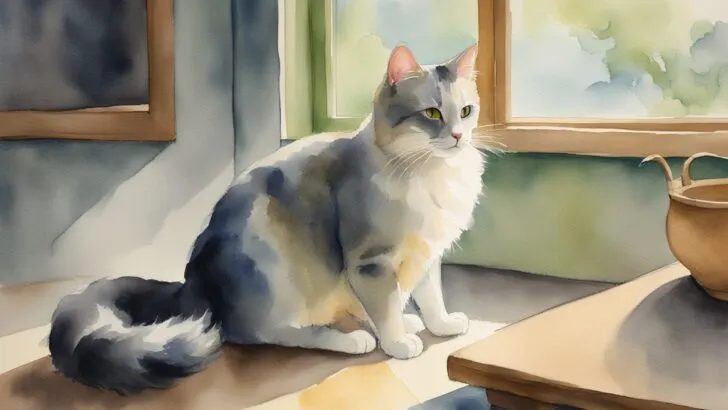Cats are known for their enigmatic personalities and behaviors that often leave you guessing, but one question you might have is whether or not they hold grudges.
From my experience and what experts say, it seems that while cats do experience a range of emotions, the idea of them holding grudges like humans may not be entirely accurate. Unlike us, cats don’t stew in their feelings; they react to negative experiences with a more instant and direct response.
For example, if you accidentally step on your cat’s tail, you might notice some immediate standoffish behavior, but this reaction is typically short-lived.

Understanding feline behavior is key to interpreting how your cat feels about you and certain situations. Cats primarily operate on instinct and their memory plays a significant role in how they interact with their environment.
They have excellent associative memories that tie their experiences to the positive or negative outcomes they’ve encountered. So when a cat seems to ‘hold a grudge,’ it may be more about remembering the bad association rather than an emotional response.
For instance, a cat might avoid the spot where it was once startled by a loud noise, but that doesn’t necessarily mean it harbors negative feelings towards the noise maker.
Remember, each cat is unique, and like people, they have different thresholds for what they perceive as distressing or unfavorable. While one feline may quickly bounce back from a startling vet visit, another may stay wary of the carrier for a considerably longer time.
Your understanding and patience play a crucial role in helping your cat overcome any negative associations, ensuring a trusting and affectionate relationship between you both.
Feline Grudge-Holding Behavior

Observing a cats body language and vocalization will provide cues about their emotional state and whether they might be harboring a grudge.
Memory and Associations
Cats have a complex memory system with short-term memory lasting around 16 hours. This means that your cat will remember negative experiences, such as a startling vet visit, for a time after the event. Long-term memory, however, is influenced by repeated events and strong associations.
If they consistently have negative encounters in a certain part of the house, they may develop a negative association with that space and appear to hold a “grudge” by avoiding it.
Stress and Anxiety as a Trigger
Stress and anxiety can prompt behaviors that might seem like grudge-holding. If your cat feels threatened or has had a stressful experience, it might react with aggression or fear.
It’s important to recognize signs of stress like hiding or displacing aggression onto territory or toys. Such behaviors are more about seeking safety and less about holding onto resentment.
Body Language and Vocalization
Your cat’s body language and vocal cues are strong indicators of their emotions. A poofed-up tail, flattened ears, or an arched back can signal anger or fear. Similarly, if they’re upset, they might hiss or growl, vocalizing their discomfort.
Rather than being scared or resentful, they might be trying to communicate that they need space or don’t like what’s happening. Understanding these signs can help you identify and address the root cause of their discomfort, rather than mistaking it for a grudge.
Strategies to Resolve and Prevent Grudges
Understanding your feline’s quirks and effectively managing their environment can promote harmony and reduce the likelihood of grudges. Here, we’ll explore practical strategies to enhance your bond with your cat and prevent negative behaviors.
Improving Human-Cat Relations
Cats are unique individuals with distinct personalities, and building a strong bond relies on respecting their autonomy. Regular playtime is crucial for engaging your cat’s mind and reinforcing positive associations with you.
Use a variety of toys to keep this interaction lively. Consistently providing affection—in the form of petting or gentle speaking—can calm a potentially irritated cat, but always pay attention to their cues to avoid overstimulation.
Professional Consultation and Routine
If a grudge persists or a cat exhibits unusual avoidance, seek professional help from a vet or a certified cat behavior consultant. These experts can assess the nature of the issue and offer tailored advice. A predictable routine, including feeding and grooming times, can also give your cat a sense of security and reduce stress.
Socialization and Interaction with Other Pets
Proper socialization can prevent territorial grudges between pets. Introduce new animals, like dogs or kittens, gradually and supervise their interactions. Designate separate safe spaces for each pet to retreat to when feeling overwhelmed. In multi-pet households, providing ample resources such as food dishes and litter boxes can avoid conflict over territory.

My name is James, and welcome to FAQCats!
Along with our team of cat owners, expert pet enthusiasts, and pet professionals, we aim to write engaging helpful, engaging content about cats. At FAQCats we strive to provide content that’s accurate and fun to read. Our team writes about everything related to cats; even the most complex of topics. Through extensive research and caring for our own fur-pals, we’re able to provide something cat owners worldwide will love. Have a look around, and leave us feedback anytime!

